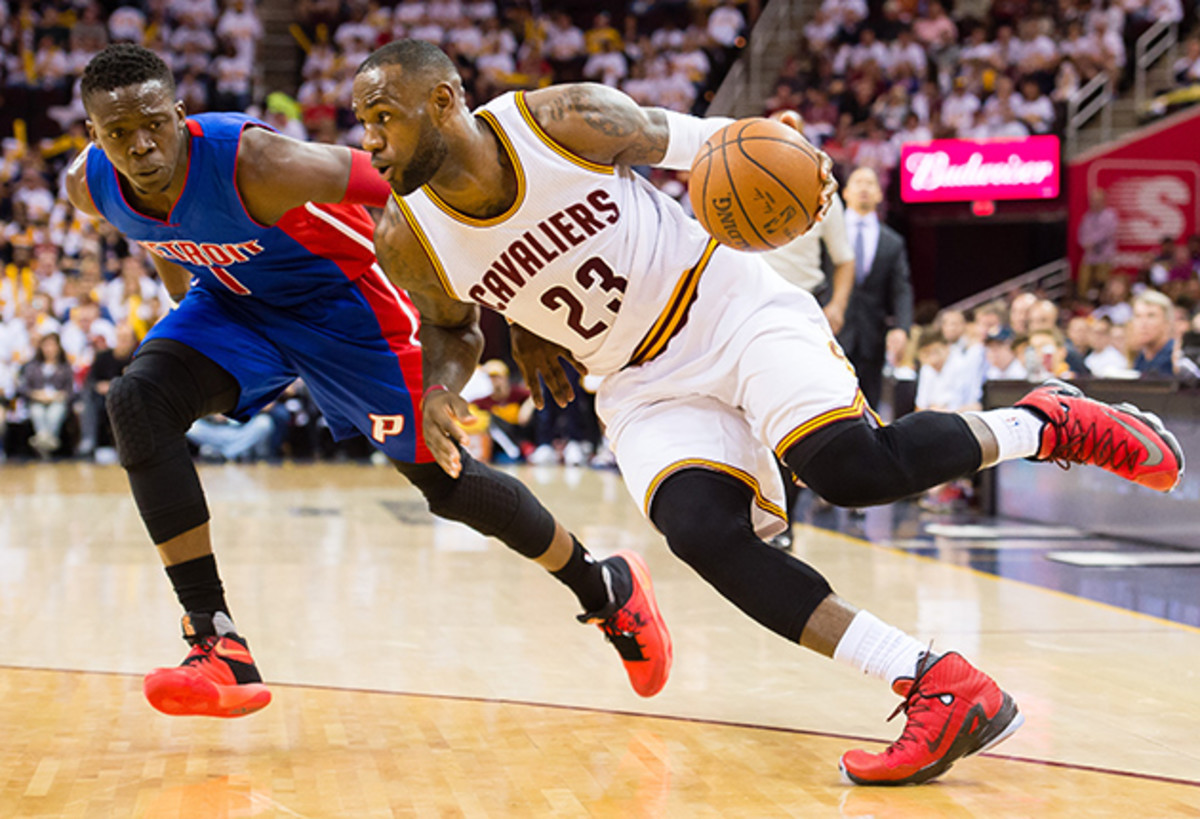Playoff problems: All the NBA superstars are on the wrong teams

It's the middle of an underwhelming first round of the playoffs. Nobody needs a hardcore breakdown of the Heat-Hornets series.
We can all live without acknowledging what's about to happen to the Grizzlies against the Spurs.
So, instead, how about some deep NBA thoughts?
Walk with me. Watch this flat earth documentary, and then come back and let's talk about what's happened to basketball this season.
• MORE NBA: How the Warriors could lose | Inside Durant's worst game ever
[youtube:https://youtu.be/X6eNZW-V3kI]
The Warriors won 73 games this year while the Spurs won 67 (including 40–1 at home), and here is a theory that helps explain why: All the superstars are on the wrong teams.
The NBA has evolved, but most of the teams that embraced the evolution did so because they had no other choice. Meanwhile, teams with real superstars have been stuck in the past. The Warriors and Spurs are the only two teams who saw where basketball was going and had real superstars to execute the vision. And so, the Warriors and Spurs went out and wrecked the whole league.
I was zoned out and thinking about this during the Rockets-Warriors series. I was thinking about it during Clippers-Blazers, too. I will definitely think about it during Hawks-Celtics as well. Every time anyone wonders why the beginning of the playoffs has felt a little bit anti-climactic in 2016, they should think about some of the superstar talent that isn’t here this year: Anthony Davis, DeMarcus Cousins, Jimmy Butler, John Wall, Carmelo Anthony, etc.
What we've seen this year is a league in transition. The playoffs feel disjointed so far, but the entire season was like this. Everybody’s preseason predictions looked awful within two months, teams like the Pelicans and Bulls spiraled into disaster, and we’ve all had to recalibrate our opinions a little bit.
NBA playoffs off to lopsided start, but showdowns loom ahead
At first, it seemed like teams were struggling because 60% of the league was clumsily trying to play small ball. Then, it seemed like parity was at work. Now … I’m pretty sure this season is a byproduct of a stylistic evolution in basketball that has hit the league like an earthquake.
You can see the aftershock in the playoff seeding itself. The Hornets are a higher seed than the Rockets? The Mavs and Grizzlies made the playoffs? Paul George’s team is five spots below DeMar Derozan’s team? The Blazers lost Lamarcus Aldridge, replaced him with Mason Plumlee and Ed Davis, and still finished fifth?
Ball movement matters more now. Defense is crucial. The right (or wrong) lineups can swing games.
Plenty of people could look at the state of the NBA and conclude that superstars don’t matter as much anymore, but that’s not quite right, either. Superstars are why the Cavs were able to have a phenomenally disjointed season and still win 57 games and finish in first place. Superstars are why the Thunder won 55 games, and superstars are why the Hawks, Raptors, and Celtics aren’t winning the title. This NBA’s not changing that much.

It is changing, though, and it’s happened incredibly fast. Remember when GMs were the rock stars? That was like 18 months ago.
A superstar-driven league created a generation of fans who worshipped the people who found them. The cutting-edge basketball conversations were about cap space and draft picks and asset management. With everyone angling to build their own superteam, coaches were almost beside the point. This isn’t a value judgment either way, but it seemed like Lionel Hollins’s league was being turned over to John Hollinger. Even 12 months ago, Tom Thibodeau got fired because management had more power.
Now things look different. Superstars that most everyone expected to shine this year—Davis in New Orleans, Butler in Chicago, Wall in D.C.—are all watching from home, and Daryl Morey’s Rockets are getting humiliated on national TV by the Warriors.
• MORE NBA: SI's 2016 playoff predictions | Playoff entertainment value
The face of “smart” teams in 2016 aren’t the great GMs, but the best coaches and killer systems. Mike Budenholzer in Atlanta, Brad Stevens in Boston, Steve Clifford in Charlotte, Rick Carlise in Dallas, Terry Stotts in Portland. “Culture” is real a thing, and it’s shaping the league now more than ever. In fact, the smartest move the Warriors ever made was not chasing a superstar (Kevin Love) and betting on Steve Kerr instead.
These teams have a few more tangible things in common beyond culture. They all move the ball incredibly well, they all play excellent defense, and they all play creative lineups that get the most out of everything they have. Also, most of them play this way because they don’t have a choice. If the Hawks didn't mimic the Spurs, they'd be a 10th seed.
It leaves the rest of the NBA in a tricky spot. I'm pretty sure teams like the Thunder and Cavs have been slow to evolve because their stars are so good they don't have to. The Wizards tried to evolve, but they applied the wrong lessons, with the wrong coach. The Pelicans had the wrong personnel. Sacramento had the wrong everything. The skeptic's response to all this might be that having true superstars precludes the kind of evolved ball-movement styles we see in Atlanta and Boston, or Charlotte and Dallas, or even Detroit. I don’t know know if I buy it.
Listen below and subscribe to our podcast on iTunes and SoundCloud.
If you put Butler in a Hawks jersey, he’d be averaging 27 points a night and playing better defense than Kyle Korver ever has. Can you imagine how much fun the conference finals would be against LeBron?
Put Wall in Reggie Jackson’s place with the Pistons, and that team probably wins 55 games, and they push the Cavs, too. Give Boogie Cousins to Terry Stotts and the Blazers instead of the Kings, and Portland could make a real run at the top of the West. All of this would dramatically improve the playoffs.
I’m pretty sure that's what's coming. Eventually, the rest of the league will look at the Warriors and realize that it’s not just Steph Curry or Draymond Green small ball that sets them apart. From the scouting to the lineups to the ball movement, the entire system is a better way to play basketball. Curry and Green just happen to make it unstoppable, but the same principles are working in Charlotte, Atlanta, Dallas, and Boston.
Either some of the NBA's more dysfunctional organizations will embrace all this over the next few years, or superstars like Wall and Butler and Boogie will leave for teams that know how to use them. Until then, as you watch the Hawks and Celtics or the Rockets and Warriors, don't be the truther who claims superstars don't matter anymore.
This first round is just part of the NBA earthquake. It’ll take a little while before things settle. Most of the smartest teams don’t have the right pieces yet.
